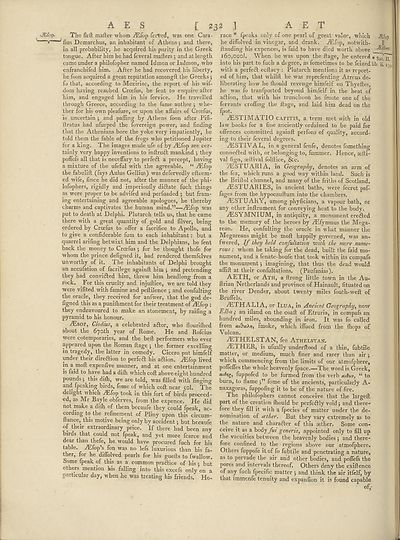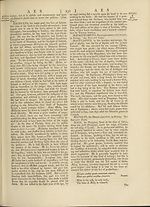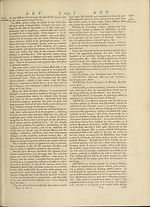Encyclopaedia Britannica, or, a Dictionary of arts, sciences, and miscellaneous literature : enlarged and improved. Illustrated with nearly six hundred engravings > Volume 1, A-AME
(256) Page 232
Download files
Complete book:
Individual page:
Thumbnail gallery: Grid view | List view

AES [ 232 ] A E T
The firft mafter whom jTlfop ferVed, was one Cara-
fius Demarchus, an inhabitant of Athens •, and there,
in all probability, he acquired his purity in the Greek,
tongue. After him he had feveral mailers ; and at length
came under a philofopher named Idmon or ladmon, who
enfranchifed him. After he had recovered his liberty,
he foon acquired a great reputation amongll the Greeks j
fo that, according to Meziriac, the report of his wif-
dom having reached Croefus, he fent to enquire after
him, and engaged him in his fervice. He travelled
through Greece, according to the fame author 5 whe¬
ther for his own pleafure, or upon the affairs of Crcefus,
is uncertain and palling by Athens foon after Pifi-
llratus had ufui'ped the fovereign power, and finding
that the Athenians bore the yoke very impatiently, he
told them the fable of the frogs who petitioned Jupiter
for a king. The images made ufe of by ALfop are cer¬
tainly very happy inventions to inllruft mankind they
poflefs all that is neceffary to perfeft a precept, having
a mixture of the ufeful with the agreeable. “ Aifop
the fabulift (fays Aulus Gellius) was defervedly elleem-
ed wife, fince he did not, after the manner of the phi-
lofophers, rigidly and imperioully diflate fuch things
as were proper to be advifed and perfuaded ; but fram¬
ing entertaining and agreeable apologues, he thereby
charms and captivates the human mind.”—Atfop was
put to death at Delphi. Plutarch tells us, that he came
there with a great quantity of gold and filver, being
ordered by Croefus to offer a facrifice to Apollo, and
to give a confiderable fum to each inhabitant: but a
quarrel arifing betwixt him and the Delphians, he fent
back the money to Croefus j for he thought thofe for
whom the prince defigned it, had rendered themfelves
unworthy of it. The inhabitants of Delphi brought
an accufation of facrilege againft him ; and pretending
they had convitffed him, threw him headlong from a
rock. For this cruelty and injuftice, we are told they
were vifited with famine and peltilence ; and confulting
the oracle, they received for anfwer, that the god de¬
figned this as a punilhmentfor their treatment of AEfop :
they endeavoured to make an atonement, by railing a
pyramid to his honour.
Also?, Cloctius, a celebrated a£tor, who flourilhed
about the 670th year of Rome. He and Rolcius
were cotemporaries, and the bell performers who ever
appeared upon the Roman Itage $ the former excelling
in tragedy, the latter in comedy. Cicero put himfelf
under their direftion to perfeft his aftion. AEfop lived
in a moll expenfive manner, and at one entertainment
is faid to have had a dilh which coll above eight hundred
pounds j this dilh, we are told, was filled with finging
and fpeaking birds, fome of which coll near 30I. The
delight which AEfop took in this fort of birds proceed¬
ed, as Mr Bayle obferves, from the expence. He did
not make a dilh of them becaufe they could fpeak, ac¬
cording to the refinement of Pliny upbn this circum-
ftance, this motive being only by accident •, but becaufe
of their extraordinary price. If there had been any
birds that could not fpeak, and yet more fcarce and
dear than thefe, he would have procured fuch for his
table, ^fop’s fon was no lefs luxurious than his fa¬
ther, for he diffolved pearls for his guells to fwallow.
Some fpeak of this as a common pra&ice of his ; but
others mention his falling into this excefs only on a
particular day, when he was treating his friends. Ho¬
race * fpeaks only of one pearl of great value, which A
he diffolved in vinegar, and drank. AEfop, notwith- I
Handing his expences, is faid to have died worth above ^
160,000k When he was upon the llage, he entered * Sat
into his part to fuch a degree, as fometimes to be feizedlib. ii
with a perfect ecllacy : Plutarch mentions it as report¬
ed of him, that whilll he was reprefenting Atreus de¬
liberating how he Ihould revenge himfelf on Thyelles,
he was fo tranfported beyond himfelf in the heat of
aflion, that with his truncheon he fmote one of the
fervants crofling the llage, and laid him dead on the
fpot.
AESTIMAITO CAPITIS, a term met with in old
law books for a fine anciently ordained to be paid for
offences committed againlt perfons of quality, accord¬
ing to their feveral degrees.
AESTIVAL, in a general fenfe, denotes fomething
conne6ted with, or belonging to, furamer. Hence, aefti-
val fign, aeftival folftice, &c.
AESTUARIA, in Geography, denotes an arm of
the fea, which runs a good way within land. Such is
the Briftol channel, and many of the friths of Scotland.
AESTUARIES, in ancient baths, were fecret paf-
fages from the hypocauftum into the chambers.
AESTUARY, among phyficians, a vapour bath, or
any other inftrument for conveying heat to the body.
AESYMNIUM, in antiquity, a monument ere£ied
to the memory of the heroes by AEfymnus the Mega-
rean. He, confulting the oracle in what manner the
Megareans might be moft happily governed, was an-
fwered, If they held confultation with the more nume¬
rous : whom he taking for the dead, built the faid mo¬
nument, and a fenate-houfe that took within its compals
the monument j imagining, that thus the dead would
aflift at their confultations. (Paufanias).
AETH, or Ath, a ftrong little town in the Au-
ftrian Netherlands and province of Hainault, fituatedon
the river Dender, about twenty miles fouth-weft of
Bruffels.
AETHALIA, or Ilua, in Ancient Geography, now
Elba ; an ifland on the coafl of Etruria, in compafs an
hundred miles, abounding in iron. It was fo called
from ctiS-xXr), fmoke, which iffued from the (hops of
Vulcan.
AETHELSTAN, fee Athelstan.
AETHER, is ufually underftood of a thin, fubtile
matter, or medium, much finer and rarer than air j
which commencing from the limits of our atmofphere,
poffeffes the whole heavenly fpace.—The word is Greek,
uiirig, fuppofed to be formed from the verb aikiy, “ to
burn, to flame 5” fome of the ancients, particularly A-
naxagoras, fuppofing it to be of the nature of fire.
The philofophers cannot conceive that the larged
part of the creation (hould be perfe6lly void 5 and there¬
fore they fill it with a fpecies of matter under the de¬
nomination of cether. But they vary extremely as to
the nature and chara6ler ef this aether. Some con¬
ceive it as a body^az generis, appointed only to fill up
the vacuities between the heavenly bodies 5 and there¬
fore confined to the regions above our atmofphere.
Others fuppofe it of fo fubtile and penetrating a nature,
as to pervade the air and other bodies, and poffefs the
pores and intervals thereof. Others deny the exiftence
of any fuch fpecific matter $ and think the air itfelf, by
that immenfe tenuity and expanfion it is found capable
The firft mafter whom jTlfop ferVed, was one Cara-
fius Demarchus, an inhabitant of Athens •, and there,
in all probability, he acquired his purity in the Greek,
tongue. After him he had feveral mailers ; and at length
came under a philofopher named Idmon or ladmon, who
enfranchifed him. After he had recovered his liberty,
he foon acquired a great reputation amongll the Greeks j
fo that, according to Meziriac, the report of his wif-
dom having reached Croefus, he fent to enquire after
him, and engaged him in his fervice. He travelled
through Greece, according to the fame author 5 whe¬
ther for his own pleafure, or upon the affairs of Crcefus,
is uncertain and palling by Athens foon after Pifi-
llratus had ufui'ped the fovereign power, and finding
that the Athenians bore the yoke very impatiently, he
told them the fable of the frogs who petitioned Jupiter
for a king. The images made ufe of by ALfop are cer¬
tainly very happy inventions to inllruft mankind they
poflefs all that is neceffary to perfeft a precept, having
a mixture of the ufeful with the agreeable. “ Aifop
the fabulift (fays Aulus Gellius) was defervedly elleem-
ed wife, fince he did not, after the manner of the phi-
lofophers, rigidly and imperioully diflate fuch things
as were proper to be advifed and perfuaded ; but fram¬
ing entertaining and agreeable apologues, he thereby
charms and captivates the human mind.”—Atfop was
put to death at Delphi. Plutarch tells us, that he came
there with a great quantity of gold and filver, being
ordered by Croefus to offer a facrifice to Apollo, and
to give a confiderable fum to each inhabitant: but a
quarrel arifing betwixt him and the Delphians, he fent
back the money to Croefus j for he thought thofe for
whom the prince defigned it, had rendered themfelves
unworthy of it. The inhabitants of Delphi brought
an accufation of facrilege againft him ; and pretending
they had convitffed him, threw him headlong from a
rock. For this cruelty and injuftice, we are told they
were vifited with famine and peltilence ; and confulting
the oracle, they received for anfwer, that the god de¬
figned this as a punilhmentfor their treatment of AEfop :
they endeavoured to make an atonement, by railing a
pyramid to his honour.
Also?, Cloctius, a celebrated a£tor, who flourilhed
about the 670th year of Rome. He and Rolcius
were cotemporaries, and the bell performers who ever
appeared upon the Roman Itage $ the former excelling
in tragedy, the latter in comedy. Cicero put himfelf
under their direftion to perfeft his aftion. AEfop lived
in a moll expenfive manner, and at one entertainment
is faid to have had a dilh which coll above eight hundred
pounds j this dilh, we are told, was filled with finging
and fpeaking birds, fome of which coll near 30I. The
delight which AEfop took in this fort of birds proceed¬
ed, as Mr Bayle obferves, from the expence. He did
not make a dilh of them becaufe they could fpeak, ac¬
cording to the refinement of Pliny upbn this circum-
ftance, this motive being only by accident •, but becaufe
of their extraordinary price. If there had been any
birds that could not fpeak, and yet more fcarce and
dear than thefe, he would have procured fuch for his
table, ^fop’s fon was no lefs luxurious than his fa¬
ther, for he diffolved pearls for his guells to fwallow.
Some fpeak of this as a common pra&ice of his ; but
others mention his falling into this excefs only on a
particular day, when he was treating his friends. Ho¬
race * fpeaks only of one pearl of great value, which A
he diffolved in vinegar, and drank. AEfop, notwith- I
Handing his expences, is faid to have died worth above ^
160,000k When he was upon the llage, he entered * Sat
into his part to fuch a degree, as fometimes to be feizedlib. ii
with a perfect ecllacy : Plutarch mentions it as report¬
ed of him, that whilll he was reprefenting Atreus de¬
liberating how he Ihould revenge himfelf on Thyelles,
he was fo tranfported beyond himfelf in the heat of
aflion, that with his truncheon he fmote one of the
fervants crofling the llage, and laid him dead on the
fpot.
AESTIMAITO CAPITIS, a term met with in old
law books for a fine anciently ordained to be paid for
offences committed againlt perfons of quality, accord¬
ing to their feveral degrees.
AESTIVAL, in a general fenfe, denotes fomething
conne6ted with, or belonging to, furamer. Hence, aefti-
val fign, aeftival folftice, &c.
AESTUARIA, in Geography, denotes an arm of
the fea, which runs a good way within land. Such is
the Briftol channel, and many of the friths of Scotland.
AESTUARIES, in ancient baths, were fecret paf-
fages from the hypocauftum into the chambers.
AESTUARY, among phyficians, a vapour bath, or
any other inftrument for conveying heat to the body.
AESYMNIUM, in antiquity, a monument ere£ied
to the memory of the heroes by AEfymnus the Mega-
rean. He, confulting the oracle in what manner the
Megareans might be moft happily governed, was an-
fwered, If they held confultation with the more nume¬
rous : whom he taking for the dead, built the faid mo¬
nument, and a fenate-houfe that took within its compals
the monument j imagining, that thus the dead would
aflift at their confultations. (Paufanias).
AETH, or Ath, a ftrong little town in the Au-
ftrian Netherlands and province of Hainault, fituatedon
the river Dender, about twenty miles fouth-weft of
Bruffels.
AETHALIA, or Ilua, in Ancient Geography, now
Elba ; an ifland on the coafl of Etruria, in compafs an
hundred miles, abounding in iron. It was fo called
from ctiS-xXr), fmoke, which iffued from the (hops of
Vulcan.
AETHELSTAN, fee Athelstan.
AETHER, is ufually underftood of a thin, fubtile
matter, or medium, much finer and rarer than air j
which commencing from the limits of our atmofphere,
poffeffes the whole heavenly fpace.—The word is Greek,
uiirig, fuppofed to be formed from the verb aikiy, “ to
burn, to flame 5” fome of the ancients, particularly A-
naxagoras, fuppofing it to be of the nature of fire.
The philofophers cannot conceive that the larged
part of the creation (hould be perfe6lly void 5 and there¬
fore they fill it with a fpecies of matter under the de¬
nomination of cether. But they vary extremely as to
the nature and chara6ler ef this aether. Some con¬
ceive it as a body^az generis, appointed only to fill up
the vacuities between the heavenly bodies 5 and there¬
fore confined to the regions above our atmofphere.
Others fuppofe it of fo fubtile and penetrating a nature,
as to pervade the air and other bodies, and poffefs the
pores and intervals thereof. Others deny the exiftence
of any fuch fpecific matter $ and think the air itfelf, by
that immenfe tenuity and expanfion it is found capable
Set display mode to:
![]() Universal Viewer |
Universal Viewer | ![]() Mirador |
Large image | Transcription
Mirador |
Large image | Transcription
Images and transcriptions on this page, including medium image downloads, may be used under the Creative Commons Attribution 4.0 International Licence unless otherwise stated. ![]()
| Permanent URL | https://digital.nls.uk/193135313 |
|---|
| Attribution and copyright: |
|
|---|
| Description | Ten editions of 'Encyclopaedia Britannica', issued from 1768-1903, in 231 volumes. Originally issued in 100 weekly parts (3 volumes) between 1768 and 1771 by publishers: Colin Macfarquhar and Andrew Bell (Edinburgh); editor: William Smellie: engraver: Andrew Bell. Expanded editions in the 19th century featured more volumes and contributions from leading experts in their fields. Managed and published in Edinburgh up to the 9th edition (25 volumes, from 1875-1889); the 10th edition (1902-1903) re-issued the 9th edition, with 11 supplementary volumes. |
|---|---|
| Additional NLS resources: |
|

